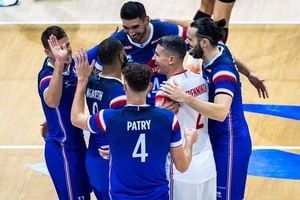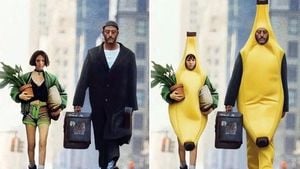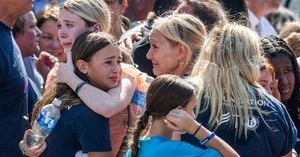The New Year's Eve terror attack on Bourbon Street, which occurred just after midnight on January 1, 2025, left New Orleans grappling with shock and grief after the senseless act of violence killed 15 individuals and injured 57 others. The assailant, Shamsud-Din Jabbar, drove his pickup truck down the crowded street, packed with revelers celebrating the new year, before being shot dead by police.
Among the victims was Tiger Bech, whose younger brother is now honoring him through his achievements on the football field. Jack Bech scored the game-winning touchdown at the Senior Bowl on February 3 and was named MVP of the game, showcasing the strength and resilience of those connected to the tragedy.
Hubert Gauthreaux, another victim of this attack, sent his sister Brooke one last New Year’s message just hours before the tragedy: "Happy New Year. I love you." Tragically, just hours later, he was among the casualties as Jabbar rammed his truck down Bourbon Street. Gauthreaux had traveled from Marrero, Louisiana, to celebrate with friends and enjoy the festivities.
The emotional toll on affected families is immense. Antoinette Klima, who lost the father of her child, Reggie Hunter, expressed the heartbreak of telling her son about his father's death. "It’s been incredibly tough. Our son has been robbed of so many milestones—a father’s presence at his first dance..." she shared, emphasizing the lasting impact of this violent act.
After the attack, Bourbon Street, once the lively heart of New Orleans celebrations, was shut down for 36 hours. During this time, mourners gathered to pay their respects, leaving flowers, memorials, and heartfelt messages at the scene. The Gauthreaux family walked with police escort to honor their lost loved one, highlighting the intimacy of loss shared among the community.
Reflections from survivors paint a harrowing picture of life after the attack. Leo Spadoni, who was present during the incident, stated, "Before the fateful night on New Year's, I was filled with hope... That moment changed everything. My sense of safety was shattered. The joy I once felt was replaced by a pervasive fear." His fears resonate with many who experienced the horror firsthand.
To add to the turmoil, civil lawsuits are now surfacing, holding the city of New Orleans and private consultants accountable for their negligence. Attorneys Aaron Maples and the firm Romanucci & Blandin are representing 21 plaintiffs, alleging the attack was predictable and preventable, based on the city's flawed safety measures. The city had allocated $40 million to improve safety protocols after previous vehicular attacks around the world, leading many to question how such tragic oversights occurred.
“New Orleans is forever changed by this tragedy,” said Maples, articulately summing up the collective sentiment among residents. “The city's reputation for vibrant street celebrations will now be shadowed by fear and loss.”
Further complicate matters, the timing of the city’s safety system upgrades led to confusion and negligence during the high-volume New Year's Eve celebrations. Witnesses have reported seeing temporary barriers installed wrongfully, allowing vehicles unfettered access onto Bourbon Street.
Authorities maintain Jabbar acted alone, but investigations continue on whether he had any acccomplices. His presence sparked fears of ideologically driven violence, bringing about nervousness and heightened security concerns among residents and tourists alike.
Despite the tragic circumstances, the city strives to reclaim its resilience. "The word 'resilient' has become synonymous with the city of New Orleans," remarked city councilwoman Lesli Harris. The glimmer of hope amid despair is reflected as businesses slowly reopen, and the soundscapes of jazz return to the streets once more.
The healing process promises to be lengthy and fraught with challenges, as celebrations slowly transition from solemnity to renewed joy. This duality remains apparent, as victims’ loved ones honor those lost, and survivors rebuild their lives, marked indelibly by the events of January 1.
While the community rallies together, questions about accountability linger on, demanding answers to prevent future tragedies. New Orleans looks forward to not just healing, but ensuring its streets are safe for all who come to revel, with hopes pinned on lessons learned from this nightmare.



